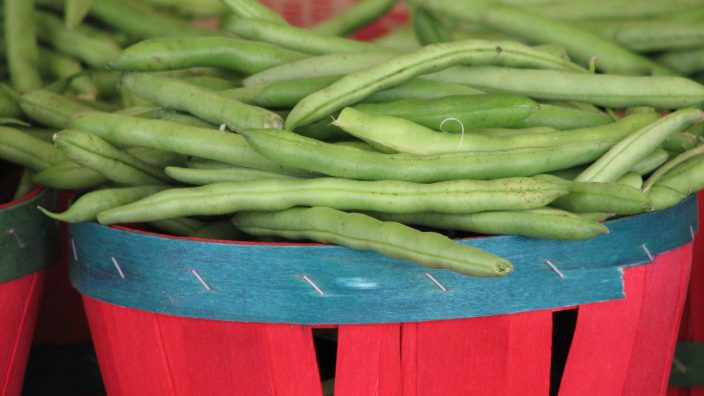Applications for Ohio Farm Bureau Health Plans now available
Members have three ways to apply: contacting a certified agent, calling 833-468-4280 or visiting ohiofarmbureauhealthplans.org.
Read MoreIn this article, we’ll explore how to become a farmers market vendor. While it may seem as easy as grabbing your goods, setting up a table and bringing in customers, there are tried-and-true tips and strategies that may improve your odds for success and increase your profitability.
Here are some steps you can take to set your plan in motion:
You may already have an idea of what you’re going to sell based on your own handmade or grown goods. If you’re an artist, it’s natural that you’re considering selling your art. If you’re a renowned baker among friends and family, you may want to sell your delicacies to the masses. Perhaps you’re considering new things to sell for the first time. Some popular items for sale at many farmers markets include produce, dairy, flowers/seedlings, honey, soap/skin care, beverages and prepared food.
When thinking about what you’d like to sell, some questions to ask yourself might be:
• Do you have the means to grow your own produce?
• What is your timeline?
• Do you plan to resell goods?
Besides having the means and materials to sell any of the above items, it’s important to note that different products may require different kinds of licenses and that each farmers market has its own rules about what you can and cannot sell.
So you’ve decided to start selling at the farmers market. A good business plan is essential for success as an entrepreneur. It will help you map out the specifics of your business and shed light on some unknowns.
A few things a business plan will help you consider are:
• What are the startup and ongoing costs?
• Who is your target market?
• How much can you charge your customers?
• What will you name your business?
Business plans are helpful no matter your level of investment — whether your farmers market is more of a hobby or full-time income.
It’s important to know what types of expenses to include in your budget.
When setting your budget, there are many things to consider, including:
• Stall fee/site location cost.
• Licenses.
• Tables and seating.
• Personnel (will you be paying staff, or will you have volunteers?)
• Storage (for merchandise
and money.)
• Credit card processing equipment.
• Promotional items (e.g., signs,
fliers and order sheets.)
• Food permit costs.
Before you start selling at a farmers market, you’ll need to get a permit for your booth. Start by contacting your market’s management team and asking what permits or licenses you’ll need to sell legally. It’s also important to be aware of local regulations and what that entails for registration (e.g., the Ohio Department of Agriculture Division of Food Safety). Ask your contacts at the farmers market about required permits and licenses. Information can also be found on the Ohio Department of Agriculture website.
If you do need to register with a state or local authority, you’ll fill out an application form, pay a nominal fee and submit to any required facilities inspections (for instance, your commercial or home kitchen).
Be proactive in claiming your spot at the market, as most farmers markets have waiting lists due to popularity among other vendors. Most markets have a website where you can apply. Otherwise, attend the market and ask to speak to a market manager. To maximize your chances of getting your first or second choice for your farmers market booth, contact market operators as early as possible, well before the season begins. Worst case scenario: You get on next year’s waiting list before all the latecomers.
You’ll need to figure out all the details of setting up your space and how to transport all your goods and wares from house to market. If your food requires refrigeration, rely on coolers until you know whether your stall in the market contains access to a power source.
If you’re a small vendor, you may be able to fit everything you need in the trunk of your car. Just be careful to package things in manageable amounts because you might have to walk a far distance from the parking lot to your stall. Consider bringing help with you to make the setup, cleanup and transportation processes easier as well as helping with the sales and monetary transactions.
To learn more about Nationwide, visit nationwide.com.
Online Extra
Legal with Leah: Selling products at farmers markets


Members have three ways to apply: contacting a certified agent, calling 833-468-4280 or visiting ohiofarmbureauhealthplans.org.
Read More

Legacy nutrient deductions enable new farmland owners to claim deductions on the nutrients within the soil on which healthy crops depend.
Read More

Farmers, agribusinesses and community members are encouraged to nominate their local fire departments for Nationwide’s Nominate Your Fire Department Contest through April 30.
Read More

Introduced by Sen. Paula Hicks-Hudson, SB 120 would establish the Urban Farmer Youth Initiative Pilot Program.
Read More

Gases, vapors, and fumes can all create risk. How can we measure and protect ourselves from them?
Read More

The Ohio Farm Bureau’s Young Agricultural Professionals State Committee has named its 2026 leadership and the individuals who will be serving on the state committee for 2026-2028.
Read More

The Ohio Farm Bureau Foundation has multiple scholarships available to Ohio students from rural, suburban and urban communities who are pursuing degrees with a connection to the agricultural industry.
Read More

With 100% bonus depreciation now permanent, farmers can deduct the full cost of a new agricultural building in the year it’s placed in service.
Read More

Lincoln Deitrick was named the Outstanding Young Farmer, Denver Davis won the Excellence in Agriculture Award, and Margaret Houts won the Discussion Meet.
Read More

Michelle Downing of Franklin County has been named finance director of county operations for Ohio Farm Bureau.
Read More